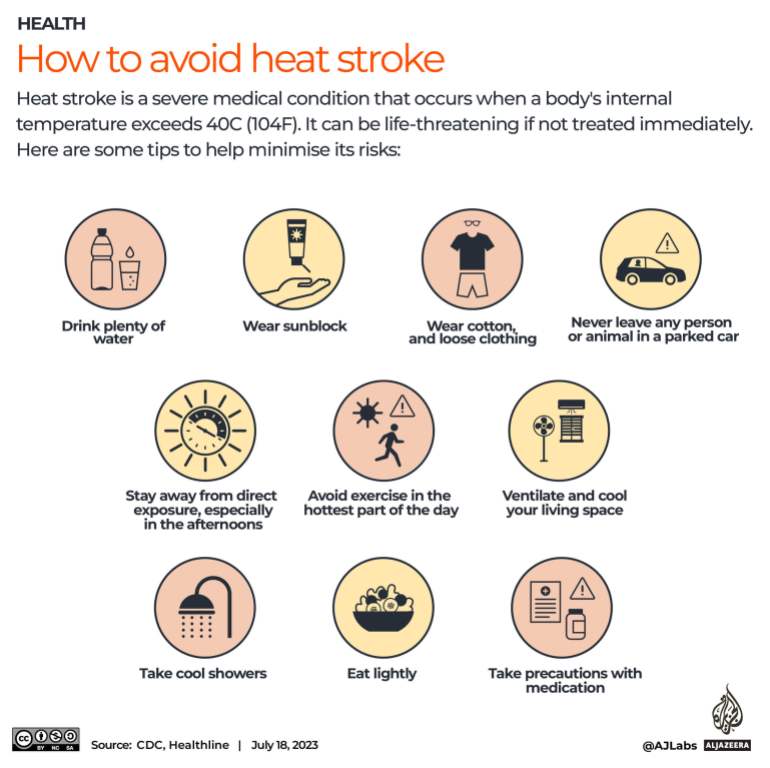Iran’s surprise ‘unprecedented heat’ shutdown raises questions
Government offices, banks, capital markets and private businesses will remain shut until Saturday.

Tehran, Iran – A national shutdown is continuing in Iran – ostensibly as a result of rising temperatures – and authorities have said that the national holiday could be extended further.
The surprise nationwide holidays through Thursday were announced by the government on Tuesday, citing a request from the health ministry, which said the request was due to the rising number of people needing medical attention after heat exposure.
Keep reading
list of 4 itemsHow to stay cool and safe during this summer heatwave
Iran’s ‘morality police’ return as authorities enforce hijab rule
Are Iran and the US on the verge of a new agreement?
Fridays are the weekend in Iran, and authorities are reportedly considering declaring Saturday – the first day of the working week – a holiday as well.
However, while temperatures have been rising in the sweltering summer heat, they have not been as “unprecedented” as the government warned.

In addition to government offices, banks and capital markets, private businesses were also ordered to shut down.
Most businesses in the capital, Tehran, appeared to comply on Wednesday, but some elected to keep their shutters open.
“We were open today and a few other shops are open as well, but I think all will probably shut down earlier than usual,” said Rouzbeh Amani, a 33-year-old who works at Tehran’s Grand Bazaar.
“There weren’t that many customers today and most were from outside Tehran,” he told Al Jazeera.
‘They say the weather is excellent’
Tehran’s average high temperature in August is about 36 degrees Celsius (97 degrees Fahrenheit), with a record high of 42C (108F).
At noon on Wednesday, temperatures were about 37 degrees Celsius (99F), and Thursday’s temperatures are expected to rise to a high of 40C (104F).
A number of cooler provinces to the north, which are closer to water, saw temperatures of about 33C (91F) while some hotter provinces in the south recorded temperatures closer to 45C (113F).
Kian, a journalist based in Sistan and Baluchestan, said the 40C temperatures in the southeast are manageable compared with temperatures of more than 50C (122F) there last month.

“Sistan was not shut down [then], even though we faced a multi-faceted crisis of dust and pollutants, hot temperatures, water tensions and power outages,” he told Al Jazeera. “I don’t understand why there’s a shutdown now, even the people of the province don’t know why, they say the weather is excellent compared to what it was then.”
Imposing a nationwide shutdown for temperatures that are, in some areas, relatively close to the normal summer range has prompted online speculation that the government is facing difficulty generating hydroelectric power, its main source of electricity.
Hamed, a 44-year-old engineer and business owner who works in the copper industry, said he believes the issue is rooted in Iran’s acute water shortages, which are fatal in a country that is mostly reliant on hydroelectric power.
“For a long time, we’ve faced severe mismanagement of water consumption, especially in industries,” said Hamed, who did not want to give his full name. “I believe these shutdowns are definitely due to power shortages borne out of water scarcity.”
The government and state media have, however, denied a connection between the shutdowns and power consumption, saying the energy ministry faces no issues in generating sufficient electricity.

The ministry has, however, raised the alarm in the past few weeks over rising power consumption, saying in late July that the country had hit a new record electricity usage level of about 72,000 megawatts per day.
Iran is no stranger to power outages at the height of the summer, but there have been fewer blackouts this year.
Hamed said this reflected a shift in the government’s approach under President Ebrahim Raisi, who would have seen the hefty criticism levelled against his predecessor Hassan Rouhani for repeated power outages and has also had to deal with social unrest in Iran, with nationwide protests last year.
“The government has shifted the load of blackouts from household consumption to industries. Industrial parks, even those on the outskirts of Tehran, faced natural gas outages during winter time, and now they are having their power consumption rationed,” said the engineer, who has worked with industrial parks around Tehran, Kerman and Tabriz.